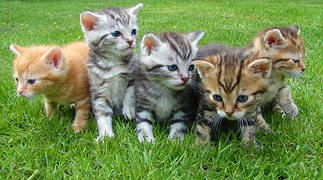Are we as healthy as we were 100 years ago? How about 50 years ago? Even 15 years ago?
Currently the USA ranks 50th for life expectancy compared to other countries, and the projected lifespan of the next generation of Americans will be shorter than their parents.
Why do the citizens of the 6th wealthiest country have such poor health? The answer might be found in Pottenger’s cat.
In 1932 Pottenger was studying the adrenal gland using cats. Due to an excess donation of unwanted cats he resorted to different feeds. He noticed that certain groups were healthier than others, so he decided to do a study on nutrition in the cats.
The study involved 900 cats which were placed in identical physical enclosures with diet being the only variable.
Group 1 ate 2/3 raw meat, and 1/3 raw milk, and cod liver oil.
Group 2 ate 2/3 cooked meat, 1/3 raw milk, and cod liver oil
On following the raw meat group over 3 generations he found facial bone structure, dental arches and dentition was normal. Tissue tone was excellent, the fur was of good quality with very little shedding. Internal organs showed full development and normal function. Over their life spans, they proved resistant to infections, to fleas, and other parasites, with no signs of allergies. In general, they were gregarious, friendly and predictable in their behavioral patterns.
Miscarriages were rare, and the litters average five kittens with the mother cat nursing without difficulty.
By the end of the first generation the cats eating cooked meat started to develop degenerative diseases and became quite lazy. By the end of the second generation, the cats had developed degenerative diseases by mid-life and started losing their coordination. The third generation of cats had developed degenerative diseases very early in life and some were born blind and weak and had a much shorter life span. Many of the third generation cats couldn’t even produce offspring. There was an abundance of parasites and vermin while skin diseases and allergies increased from an incidence of five percent in normal cats to over 90 percent in the third generation of deficient cats. Kittens of the third generation did not survive six months. Bones became soft and pliable and the cats suffered from adverse personality changes. Males became docile while females became more aggressive. The cats suffered from most of the degenerative diseases encountered in human medicine and died out totally by the fourth generation.
Pottenger also studied the effects of raw vs pasteurized milk with similar results.
Scientists today are finding that nutritionally deficient diets in animals induces alteration in the expression of genes, not the genetic sequence.
We are in the throes of epidemics of; autism, autoimmune diseases, cancer, allergy, suicide and violent behavior, chronic disease and infertility. Could our over processed nutrient deficient diet be a key factor?
Terry Pfau, DO, HMD

